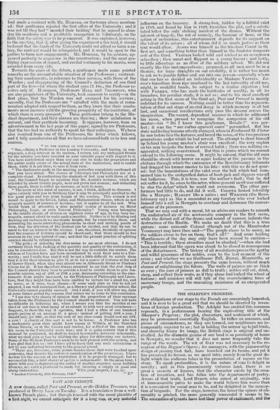PAST AND PRESENT.
A NEW drama, called Past and Present, or the Hidden Treasure, was produced at Drury Lane on Tuesday. It is a translation from a well- known French piece, but though received with the usual plaudits of a first night, we cannot .antieipate for it a long run, or.any material influence on the treasury. A strong-box, hidden by a faithful valet in 1789, and found by hint in 1829, furnishes the plot, and a substi- tuted letter the only striking incident of the drama. Without the interest of tragedy, the wit of comedy, the humour of farce, or the action of melodrame, this entertainment depends for its support on the talent of its actors ; all of whom did it as much justice as their text would allow. JONES was himself as the frivolous Count in th first act, and something better than himself in the hazdator temporis acti of the third. VESTRIS looked wild and wicked as an overgrown schoolboy ; then smart and flippant as a young hussar ; and lastly, to little advantage as an egve of the military school. We did not exactly like this metempsychosis ; prepared, as all men must be in a theatre, for large draughts on our credulity, it is rather too much to ask us to jumble father and son into one person—especially where that one has so decided an individuality as Madame VESTRIS. La- rose's transition from ripe manhood to the la.st imbecility of old age, might, in unskilful hands, be subject to a Similar objection ; but with FARREN, who has made the habitudes of senility, in all its branches, his peculiar study, it is not so ; and to his most excellent acting in the first scene of the third act, Past and Present is mainly indebted for its success. Nothing could be better than his represen- tation of that sad stage of mental decay in which memory is all but lost, and occasional recollections only pass like dreams across the imagination. The vacant, dependent manner in which he addressed his niece, when pressed to recognize the companion of his old master—his "Do I know this gentleman, Rosalie ?" was per- fect; it was the "nec vultus agnoscit amici" personified. But his state and feeling became utterly changed, when in Ferdinand St. Victor he saw before him the features, and heard the voice, of the two previous generations under whieh he had served. The attempt to draw himself up behind his young master's chair was excellent ; the very napkin on his arm bespoke the force of revived habit ; there was nothing ex- aggerated, nothing overstrained. But this is praise which we cannot extend to the following scene. It might be natural, that the old man should be struck with horror on again looking at the passage in the chilteitu through which the emissaries of the Revolutionary tribunals had dragged his former master to his fate : with this we do not quar- rel: but the lamentations of the valet over the bell which had sum- moned him to the undignified duties of boot-jack and slippers was all but ludicrous. This, it is true, was the author's fault ; that he did not suffer for it, he owes to the actor, whose general merit was suffered to slur the defect` which he could not overcome. The other per- formers had little to do, and did it well. COOPER looked tolerably like a Marquis ; HARLEY like a calico ; and WEasraa (the Revo- lutionary spy) as like a scoundrel as any turnkey who ever locked himself into a cell in Newgate to overhear and denounce the conver- sations of its prisoners. That we may end with a moral, let us advise our readers to remark the undisturbed air of the aristocratic • company in the first scene, while the distant roll of the drums and sound of cannon indicate the destruction of the Bastile. We make no doubt that this is a true picture : some coxcomb Colonel (though not of the Manchester Yeomanry) may have then said—" The people chose to be saucy, so the soldiers chose to fire on them, that's all!" And some leading Marchioness of the day may only have been roused to exclaim— "This is terrible ; these atrocities must be checked,"—when she had been informed that the opera was about to be closed in consequence of the disturbances. The history of all revolutions proves the apathy and wilful ignorance of the nobles, even to the last moment of the crisis ; and whether we see Guillaume Tell, Rienzi, Masaniello, or Past and Present, the stage presents the same lesson, without much chance of enlightening the future. The walls of palaces are as thick as ever ; the ears of princes as dull to truth ; nobles will eat, drink, sleep, and collect their rents, as if they alone had locked the wheel of fortune ; and ministers will still talk of the overwhelming force of mercenary troops, and the unavailing resistance of an exasperated people. •


















 Previous page
Previous page